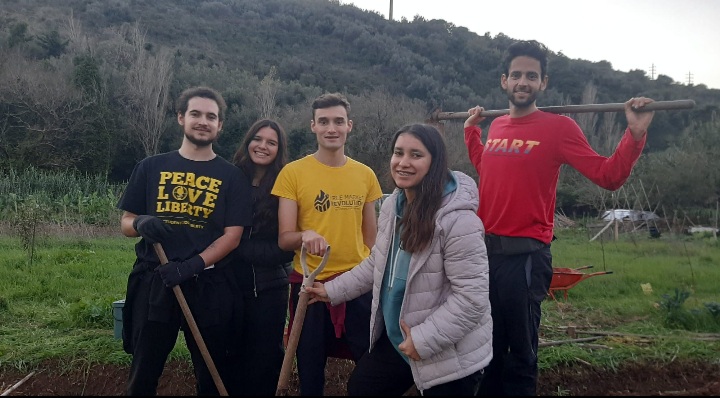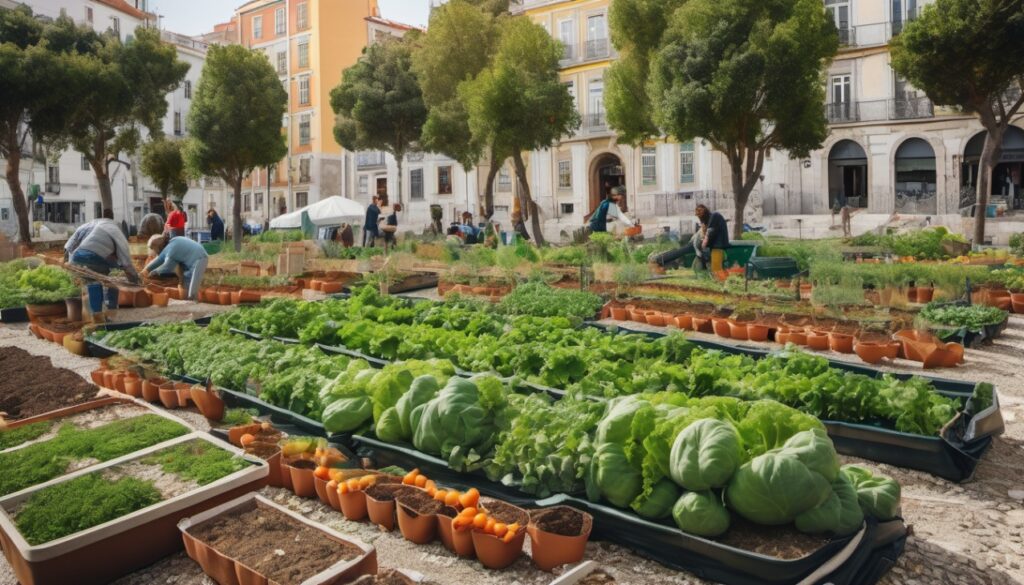The personal and societal benefits of gardens
This past March, Students For Liberty’s group in Lisbon, Portugal embarked on the second edition of a deeply meaningful activit to us. Now, it might sound odd, but its goals were clear and aligned with the cause of liberty.

By volunteering with a private, entrepreneurial vegetable garden, we put our pro-liberty ideals into practice and assisted in the reduction of greenhouse emissions, plastic waste, and the use of harmful chemicals in farming. Here’s how.
Vegetable gardens and the environment
Vegetable gardens are generally better for the environment for several reasons.
- The goods produced in private vegetable gardens are unlikely to be wasted since one tends to produce only the amount needed for a certain period of time. On the contrary, in supermarkets, foods often end up in the trash can, especially the most perishable ones such as fruits and vegetables.
- Vegetable gardens can reduce wasteful packaging. Even though the promotion and production of reusable packaging is growing, the world still creates 141 million tonnes of plastic packages each year. Plastic is known to be harmful for the environment, as it takes hundreds of years to decompose.
- Vegetable gardens can reduce the use of substances like pesticides, fertilizers, and synthetic chemicals. Natural fertilizers are better for the soil and ecosystems.
- The carbon emissions that many governments and institutions are so worried about are almost nonexistent in personal vegetable gardens, contrary to what happens in commercial farming. Commercial farming requires a high amount of resources and heavy equipment, not just for production but also for transportation; the products you see on supermarket shelves have often traveled many kilometers to get there. This type of equipment requires fossil fuels to work, which causes air and water pollution and can ultimately contribute to global warming and climate change.
I’ll also add a few more benefits that are harder to quantify but are still worth mentioning.
- Working in vegetable gardens promotes moving the body and spending time outdoors, which are things we all should probably do more of. They and the general feeling of connection to nature are therapeutic to many people.
- Planting your own food inspires a sense of entrepreneurship that can spill over to other areas of life. (For example, read about How Entrepreneurship Provides a Helping Hand.)
- Finally, some of the clients we talked to when we went to the vegetable garden said consuming the (pardon the pun) fruits and vegetables of their own labor was emotionally rewarding.

A private agricultural club
The specific project SFL Lisbon is supporting is called “A Minha Quinta – Clube Agrícola” (“My Farm – Agricultural Club”).
Since it revolves around vegetable gardens, it has every benefit referred to above, but with an extra perk: It’s privately owned. Pedro Moreira, the project’s creator, explained to me that he needed a solution for his family’s old farm, which used to be a wide and abandoned space.
To revive it and make it useful, Mr. Moreira decided to start a business in which clients voluntarily pay a fee every month to benefit from a land parcel where they can plant their own fruits and vegetables and later use them for their own consumption.
Mr. Moreira also revealed some advantages his privately owned club has over the State-owned “communitarian vegetable gardens.” Since the farm has always been used for agricultural ends, its soils are of better quality, as is its spring water, which does not belong to the public supply network. Furthermore, the club provides its members with everything they need, such as tools, manure, and even a stove. It also has a wall around it, ensuring security.
Still, you might ask, how is supporting vegetable gardens “pro-liberty” in any sense?
Vegetable gardens and lower taxes
If paying taxes really annoys you, if you straight up consider taxation to be theft (read more on that topic HERE), or if you just dislike the State in general, then having your own vegetable garden parcel might be something to look into.
By producing your own carrots, tomatoes, or cabbage — foods which, by the way, are generally considered healthy — you avoid going to the supermarket to buy them. And, at least here in Portugal, buying at a supermarket involves paying additional taxes — 4% to 6% of the sale price, depending on the region.
When you eat what you plant, you avoid giving money to the State. And the savings can really add up. For the price you’d pay for a head of lettuce in the supermarket, you can probably plant around 20 heads in your own vegetable garden.
Let me be clear: Vegetable gardens are not some miracle cure for pollution or any of the other things that plague the environment, though Professor Antony Davies talked about the closest thing to a miracle cure for the environment in this short video:
But still, creating your own, private vegetable garden, or supporting someone else’s, is a helpful, healthy, and delicious start.
For further reading, see: How Sustainable Farming is paying off for Australian farmers.
Are you a student interested in getting involved in pro-liberty activism? By applying to join Students For Liberty’s Local Coordinator Program, you can be supported in promoting the ideas of liberty while also developing your skills and meeting many like-minded students from across the world. Click on the button below to find out more and get involved!
This piece solely expresses the opinion of the author and not necessarily the organization as a whole. Students For Liberty is committed to facilitating a broad dialogue for liberty, representing a variety of opinions.



